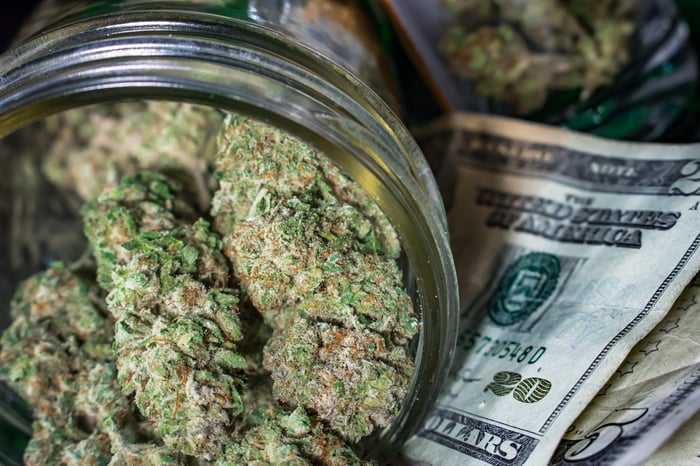If you look around, chances are you won't find many marijuana stocks struggling. In fact, over the trailing one-year period, 12 out of 13 pot stocks with a market cap above $200 million had risen, with a majority up by at least 100%!
Marijuana stocks are mostly budding
A pretty steady change in market dynamics has caused this so-called "budding" of marijuana stocks. From the perspective of perception, more consumers than ever have either a positive view of the drug or want to see it legalized nationally. This all-time high in terms of favorability gives investors hope that Congress will indeed listen to the will of the people and alter its current scheduling at the federal level.

Image source: Getty Images.
Select state governments have also pushed hard to get weed legalized. For example, residents in California wound up legalizing adult-use pot by a strong majority in the November 2016 elections, which is a delight to state legislators. California is known for running budget deficits, and the legalization of recreational marijuana should wind up generating $1 billion or more in tax revenue each year. That should help California make a dent in its budgetary needs.
Legal sales growth figures have been another major catalyst. Cannabis research firm ArcView is estimating that legal sales growth in North America could average 26% through 2021, leading to a nearly $22 billion market within five years.
The one bad apple among marijuana stocks
But there's always an outlier -- and for the marijuana industry that's drugmaker Insys Therapeutics (INSY). While a dozen of the largest pot stocks have rallied over the trailing year, it's the lone marijuana stock that's moved lower.
The source of most of Insys' issues can be traced to sublingual breakthrough cancer pain therapy Subsys. Lawsuits and allegations suggest that up to 80% of Subsys prescriptions written may have been for off-label uses. Last August, Illinois Attorney General Lisa Madigan filed a lawsuit against Insys claiming that the company was purposefully marketing Subsys to physicians that primarily prescribed opioid therapies (Subsys is a synthetic opioid), rather than oncologists, which is where Subsys' label indicates it should be used. This is one of numerous lawsuits thrown Insys' way.

Image source: Getty Images.
In addition, federal prosecutors in Boston have charged six former Insys executives and managers, including former CEO Michael Babich, with a scheme to bribe doctors to prescribe Subsys. All six defendants have pleaded not guilty.
The result of these ongoing investigations into Subsys' usage has hammered sales of the drug, pushed Insys from healthy quarterly profits to growing losses, and crushed investors', physicians', and patients' confidence in the company.
On Aug. 3, Insys wound up reporting its second-quarter results, which showed a steep plunge in quarterly Subsys sales. Total revenue came in at $42.6 million, down from $69.2 million, and sales of the drug are now running at about half the pace they were on a quarterly basis from two years ago. It also lost $8.2 million after generating net income of $6 million in the year-ago quarter. Insys' press release also notes that it settled with the State of Illinois for $4.5 million over the aforementioned lawsuit.
"Yuck" pretty perfectly describes Insys' second-quarter report and performance over the past year and change.

Image source: Getty Images.
This drug launch has game-changing potential
However, there was one tidbit of important info in the company's report that could soon give Insys' shareholders a reason to cheer: a new drug launch.
Just two weeks ago, the company launched Syndros, its second Food and Drug Administration (FDA)-approved product, for the treatment of chemotherapy-induced nausea and vomiting (CINV), as well as anorexia associated with AIDS. Syndros is a liquid, oral dronabinol solution, which is a fancy way of saying it's a synthetic version of tetrahydrocannabinol, or THC, the psychoactive component of cannabis.
Insys and its shareholders have been waiting a long time to bring Syndros to market. The FDA gave the thumbs-up to Syndros back on July 5, 2016. But because it's composed of synthetic THC, and cannabis is illegal at the federal level, it meant that Syndros' launch would be delayed while the U.S. Drug Enforcement Agency (DEA) scheduled the drug and the FDA approved its final marketing label. It took until earlier this year before the DEA placed a Schedule II categorization on Syndros, and only more recently did the FDA finally approve its label. All told, it took nearly 13 months from approval for Insys to finally launch its new marijuana drug.
Now here's where the excitement kicks in. Syndros is expected to bring in roughly $300 million to $400 million in peak annual sales, if the drug is effectively launched and priced. If Subsys sales merely stabilized where they're at now, and Syndros became a $150 million franchise within a few years, Insys would be back to generating $300 million to $350 million in annual sales once again. More importantly, it would be generating healthy cash flow and should be profitable. Let's not forget that this was a nearly $45 stock two summers ago and is now hovering around $10 per share.

Image source: Getty Images.
Syndros won't necessarily have the red carpet rolled out, even if it is a synthetic THC solution. There are a number of already approved treatments for CINV on pharmacy shelves, meaning it could be tough for Syndros to initially capture market share. You can also probably count on seeing regulators keep a watchful eye on Insys with Syndros, given how many issues arose with Subsys.
Nevertheless, it gives Insys, and long-term shareholders who can stomach a lot of expected near-term volatility, the opportunity to benefit from a return to sales growth and bottom-line improvement. It may take a few quarters before we have a good bead on the success of Syndros' launch, but exciting things are happening, and investors should take note.





